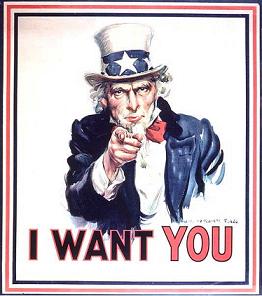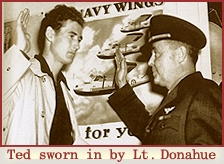 The incoming Chair of the House Ways and Means Committee, U.S. Rep. Charles (Charlie) Rangel (D-NY), has proposed that the United States renew the military draft, which has been suspended since 1973. Rangel sponsors a bill that would require military or civilian service for all American citizens ages 18 to 26. Many nations have similar laws, including Israel, South Korea, and Norway. If Rangel's bill became law, it could have sweeping effects on both college and professional sports.
The incoming Chair of the House Ways and Means Committee, U.S. Rep. Charles (Charlie) Rangel (D-NY), has proposed that the United States renew the military draft, which has been suspended since 1973. Rangel sponsors a bill that would require military or civilian service for all American citizens ages 18 to 26. Many nations have similar laws, including Israel, South Korea, and Norway. If Rangel's bill became law, it could have sweeping effects on both college and professional sports.
But why would Rangel--a purple heart, bronze star veteran of the Korean War--support such a bill? Basically, he argues that spreading military obligations more equitably would encourage political leaders and opinion leaders to more carefully deliberate the deployment of troops into combat. After-all, of the 535 members of Congress, only 7 have children in the military who are participating or could be called to participate in the war. I'm not sure if there is similar data on the opinion-leader/think-tank types who championed the Iraq War, but I suspect a similarly small percentage did so with the prospect of personal loss. A more general analysis of the relationship between military recruitment and socio-economic status can be read here, which details how young men from poorer backgrounds are actively recruited, while those from more affluent communities receive much less attention. Rangel also has an op-ed in the New York Daily News which notes that persons of color bear a disproportionate share of protecting the country.
Rangel's proposal also goes to the absence members of Congress with military backgrounds. In fact, according to University of Maine law professor Donald Zillman, only about 30% of Congresspersons have military backgrounds, and only one in 10 of the newly-elected members of Congress served in the military. Back in 1978, about 80% of the members of the House of Representatives had military experience, and in 1985, about 75% of the members of the Senate had that experience. Times have indeed changed, and not many of the people who are entrusted with the decision to authorize wars do so with actual knowledge of what wars are like.
Of course, whatever conceptual appeal Rangel's plan may have, his bill is very unlikely to secure passage. Many influential members of his own party, including incoming chair of the Senate Armed Forces Committee, Senator Carl Levin, oppose it, and fewer than 20% of Americans are supportive. Perhaps most significantly, Rangel's plan will not be on the Democrats' agenda when they re-take control of Congress in January.
But let's say that Rangel's plan gradually gains support in 2007, eventually makes its way for a vote, passes, and President Bush signs it (or vetoes it, but his veto is overridden). Beyond many more important questions, what would happen to sports?
The specifics of the draft or compulsory service obligation would obviously prove crucial, as would the nature, extent, and duration of future American forces in Iraq (and/or other countries). But as a barometer, consider how compulsory military service in World War II substantially affected sports. In fact, 638 NFL players served during the war, as did more than 500 MLB players.
To see one specific effect, take a look at Matthew Algeo's fascinating new book Last Team Standing: How the Steelers and the Eagles - 'The Steagles' - Saved Pro Football During World War II. In it, he writes about how the Philadelphia Eagles and Pittsburgh Steelers, both having lost many players to military obligation, actually merged for the 1943 season and were called "The Steagles." They finished with a 5-4-1 record.
Much has also been written about star MLB players being drafted. Ted Williams, Joe DiMaggio, Hank Goldberg, and Bob Feller were among them. To the right we see a picture of Ted Williams--he of the 20:10 vision--being sworn into the Navy, for whom he would star as a fighter pilot (in both WWII and the Korean War). For some great background on "Wartime Baseball" be sure to check out Gary Bedingield's Baseball in Wartime website and also the Baseball during WWII website.
Another consequence of players being overseas was the rise of women's professional baseball. Between 1943 and 1954, we had the All-American Girls' Baseball League, which according to historian James A. Percoco, is the only professional baseball league for women in American history. A similarly positive effect was a greater desire for desegregation in sports, particularly after soldiers from all racial/ethnic backgrounds fought together to defeat the Nazis.
The Vietnam War also entailed the drafting of professional athletes. For instance, Juanita Secor writes about Rocky Bleier, "who won four Superbowl rings with the Pittsburgh Steelers and drafted during the Vietnam War in the Army as an infantrymen. After his time in the war, he suffered severe leg injuries but he never lost sight of his passion for the game. He ended playing for 12 years more and was the go to guy for his team."
So what might happen to sports today with a draft? Would the legacy of Pat Tillman voluntarily giving up his NFL career and ultimately his life prove influential? Would the legacy of Muhammad Ali refusing the Vietnam War draft as a conscientious objector also prove influential? You can argue that both were courageous in their own ways, and I suspect their stories would be spotlighted should a draft be reinstituted.
skip to main |
skip to sidebar
Blog Archive
-
▼
2006
(592)
-
▼
December
(38)
- 2006-The Year in Review
- The Ford Legacy
- Popularity from Sports to Politics and Back
- More on Bush as Commisssioner: Someone is Reading
- Ninth Circuit Ruling Isn't Just About Steroids in ...
- Federal Government May Review MLB Player Drug Tests
- Sports Prediction for the New Year
- Bah Humbug
- Titans Sued for Mascot's Behavior
- DVD-Some Kind of Monster
- Random Thoughts on Various Subjects
- Money for the Blind
- John Rocker and Free Speech (Again)
- Leaking Information: National Security and Sports ...
- Does Baseball Need to Broaden its "Other Activitie...
- Lamar Hunt: A Sports Law Memorial
- Did Daisuke Matsuzaka "Overrule" Scott Boras?
- Nepotism and the Andy Roddick Foundation?
- The Dark Side
- My Friend Tiff
- Lawyers in Demand at University Athletic Departments?
- David Stern Drops New Basketball Crusade
- New Sports Law Scholarship
- Trying to Have it Both Ways (A Wasteland Reprise)
- Scott Boras and the Lack of Good Faith in Matsuzak...
- Luminescent Basketball Uniforms Coming to an Arena...
- Revenge of the Groupies, 46 years later
- Tom Brady [insert football pun here in place of th...
- How Would Reinstituting the Military Draft Affect ...
- Welcome Back: Mutombo, Richards, and Racist Cheeri...
- Rick Karcher Goes to Washington
- The Wasteland
- Law Schools with Sports Law Profs, 2006-2007
- Graduation Gap Bowl
- The Economics of the (Curious) MLB Posting System
- Weekend Recap
- New Sports Law Scholarship
- Patriots Sue StubHub
-
▼
December
(38)
Popular Posts
-
After a little over a week since 48 players exchanged numbers with their teams, and according to my research 13 players have signed if you i...
-
This is my opening post on my blog. This blog is going to be about the Media/ Sports/Music/Politicans. I hope ya'all find it interestin...
-
I am going ahead with the idea of facilitating barter exchanges between readers, chosing the old-school method in the interest of simplicit...
-
Male porn stars are famous for their above average endowments. Ron Jeremy is measured at 9.75 inches. Another famous porn star was John Holm...
-
I take what I call a journalistic interest in a variety of sports. If I didn't write, I wouldn't waste my time learning about them. ...
-
Paula Radcliffe is a distance runner who hails from Britain. She is the first woman to ever go below 2:20 for the marathon redefining what w...
-
Today's FT has a special report on Nigeria, and has a very interesting discussion of energy access : Despite average cash injections of...
-
Just wanted to thank everyone who has been apart, visited or entered our contests on this blog and help us get to 30,000. It's not quite...
Copyright © 2011 Sport News Update | Powered by Blogger
Design by Free WordPress Themes | Bloggerized by Lasantha - Premium Blogger Themes | Website Value Calculation Tool





0 comments:
Post a Comment